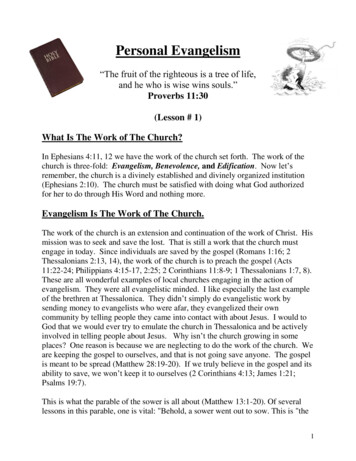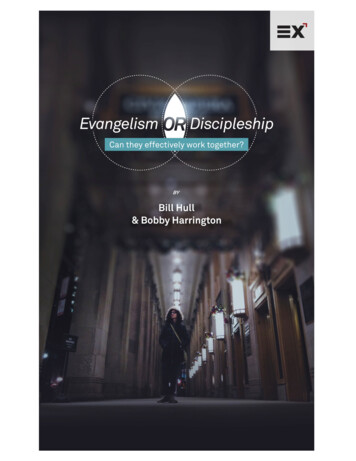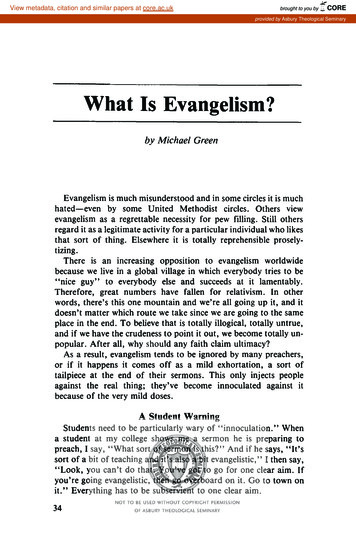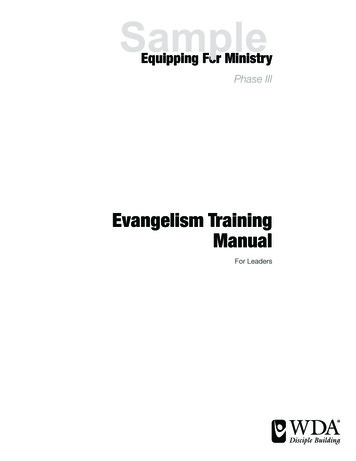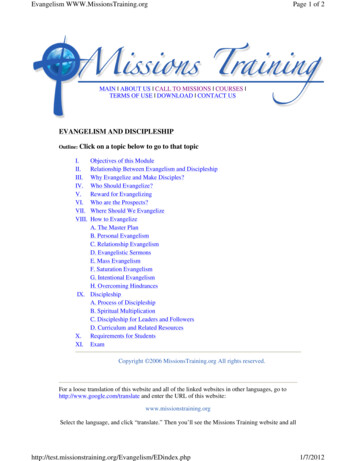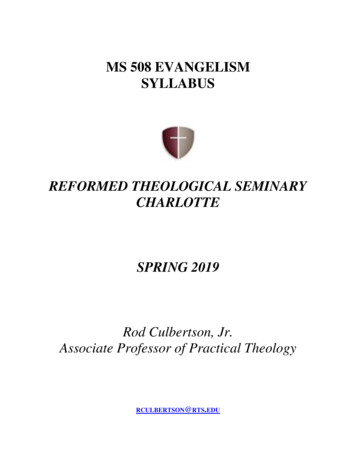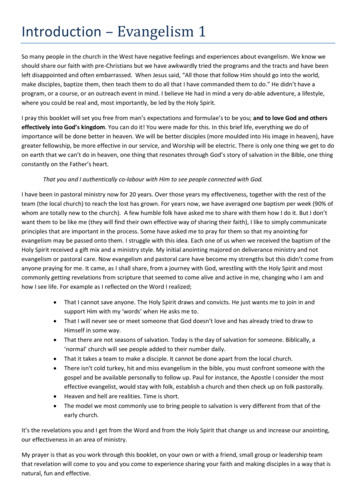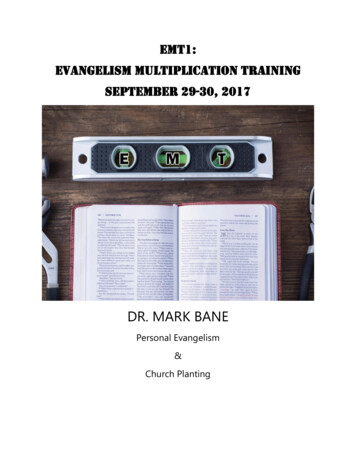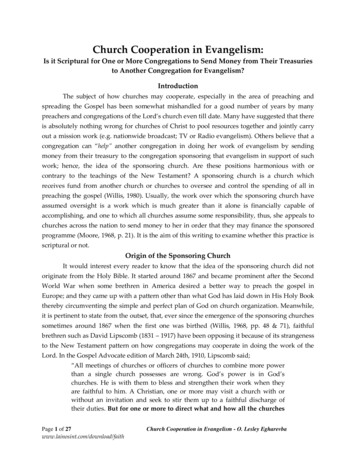
Transcription
Church Cooperation in Evangelism:Is it Scriptural for One or More Congregations to Send Money from Their Treasuriesto Another Congregation for Evangelism?IntroductionThe subject of how churches may cooperate, especially in the area of preaching andspreading the Gospel has been somewhat mishandled for a good number of years by manypreachers and congregations of the Lord’s church even till date. Many have suggested that thereis absolutely nothing wrong for churches of Christ to pool resources together and jointly carryout a mission work (e.g. nationwide broadcast; TV or Radio evangelism). Others believe that acongregation can ‚help” another congregation in doing her work of evangelism by sendingmoney from their treasury to the congregation sponsoring that evangelism in support of suchwork; hence, the idea of the sponsoring church. Are these positions harmonious with orcontrary to the teachings of the New Testament? A sponsoring church is a church whichreceives fund from another church or churches to oversee and control the spending of all inpreaching the gospel (Willis, 1980). Usually, the work over which the sponsoring church haveassumed oversight is a work which is much greater than it alone is financially capable ofaccomplishing, and one to which all churches assume some responsibility, thus, she appeals tochurches across the nation to send money to her in order that they may finance the sponsoredprogramme (Moore, 1968, p. 21). It is the aim of this writing to examine whether this practice isscriptural or not.Origin of the Sponsoring ChurchIt would interest every reader to know that the idea of the sponsoring church did notoriginate from the Holy Bible. It started around 1867 and became prominent after the SecondWorld War when some brethren in America desired a better way to preach the gospel inEurope; and they came up with a pattern other than what God has laid down in His Holy Bookthereby circumventing the simple and perfect plan of God on church organization. Meanwhile,it is pertinent to state from the outset, that, ever since the emergence of the sponsoring churchessometimes around 1867 when the first one was birthed (Willis, 1968, pp. 48 & 71), faithfulbrethren such as David Lipscomb (1831 – 1917) have been opposing it because of its strangenessto the New Testament pattern on how congregations may cooperate in doing the work of theLord. In the Gospel Advocate edition of March 24th, 1910, Lipscomb said;‚All meetings of churches or officers of churches to combine more powerthan a single church possesses are wrong. God’s power is in God’schurches. He is with them to bless and strengthen their work when theyare faithful to him. A Christian, one or more may visit a church with orwithout an invitation and seek to stir them up to a faithful discharge oftheir duties. But for one or more to direct what and how all the churchesPage 1 of 27www.lainosint.com/download/faithChurch Cooperation in Evangelism - O. Lesley Egharevba
shall work, or to take charge of their men and money and use it, is toassume the authority God has given to each church.” (emp. mine).Earlier in 1890, Lipscomb had referred to all such concentration of control of the means,money and power of many churches under the authority of the elders of one church as‚destructive of the activity and true liberties of the church and degrade and dishonor those ofthe other‛ (Lipscomb, 1890, p. 295). Similarly, Srygley (1931), irritated by this whole idea of thesponsoring church noted that elders of a church has no authority to take charge of the money ormeans of any church except the one over which they were overseers. In his words, ‚Elders ofone church should not try to get hold of money that has been contributed by others to direct forthem in foreign fields or other places.‛Ever since then, countless works and scholarly materials have been churned out by otherbrethren such as G. C. Brewer (1884 – 1956), Nicholas Hardeman (1874 – 1965), Foy Wallace Jr.(1896 – 1979), Jefferson Tant (1861 -1941), Fanning Yater Tant (1908 – 1997), Roy Cogdill (1907 –1985), Leslie Diestelkamp (1911 – 1995) with Billy Moore (two of the pioneering preachers whopreached the gospel in Nigeria in its early years) and a host of others who hold to the Biblicalposition. While it is recognized and understood that these brethren are not our ‚authority‛ onwhat is right or wrong in religious issues, they have only been pointed out to show that: The idea of the sponsoring church came outside of the New Testament and Opposition to the sponsoring church did not start today; rather it started shortly after itwas introduced.In fact, G. C. Brewer stated in 1953 that the whole idea of the sponsoring church wasborn ‚because of a very sad condition which existed in the brotherhood forty or fifty years ago‛(1953, p. 544). He also noted that the idea came from denominationalism. This shows that theidea did not originate with the early Christians. Little wonder why in his autobiography,written shortly before his death (but published afterwards), he lamented that ‚the greatest griefof my soul as I face eternity is the fact that brethren have seemingly almost universallydenominationalised the church.‛ (Brewer, 1957, p. 119)Again, the works cited above (and others that will be subsequently cited) are notpresented as a standard to be followed on this subject. The Bible (New Testament) is the onlystandard to prove if a Christian religious practice is right or wrong. Hence the Holy Bible shallbe used to substantiate the claim that it is unscriptural, inexpedient and sinful for one or morecongregations to send money from their treasuries to another congregation for evangelism. Thisis because the only rule of faith that guides the Christians is the Holy Bible. The Socratic Dictumstates that ‚the unexamined life is not worth living.‛ Similarly, this writer believes that theunexamined faith is not worth believing. Thus, we shall extensively examine this pattern ofcongregational cooperation of the sponsoring church, using the New Testament. Any practice,no matter how popular or highly esteemed amongst men, if not found in the Bible and cannotPage 2 of 27www.lainosint.com/download/faithChurch Cooperation in Evangelism - O. Lesley Egharevba
be justified with the Bible, is either the doctrine of men (Matthew 15:9) or doctrine of the devils(I Timothy 4:1) which is sinful and could lead one to hell. The way that seems right to a manmay have a destructive end (Proverbs 14:12; 16:25).How to Establish Scriptural AuthorityIt is important to grasp how scriptural authority is established before delving into themain subject as this would help us in understanding it better. Quoting Hardeman (1938, p. 52),Moore (1971, p. 31) posited that brethren have long recognized that there are three ways ofestablishing authority. They are direct statement, approved examples and necessary inference.In other words, if we have a direct command (e.g. Hebrews 10:27), an example (e.g. Acts 20:7)and a necessary inference from passages of the New Testament, they can serve as law orauthority. Using the Lord’s Supper as an example, Moore (1971, p. 32) affirmed that we knowwhat to eat and drink by a Direct Statement (Matthew 26:26-28). We know when to eat anddrink by an Approved Example (Acts 20:7) and we know the frequency of eating by aNecessary Inference (Acts 20:7, cf. Exodus 20:10). Any religious practice that we cannot providea law backing such; either by command, example or necessary inference, we must conclude thatsuch a practice is lawless and sinful because the Bible tells us that sin is lawlessness (I John 3:4).Some have objected to these natural and logical ways of establishing Scriptural authorityby stating that the New Testament is not sufficient for us; they claim it is not a rule book and wemay not need to have authority for all that we do, as we may use our ‚common sense‛ and/orsituation to determine what is right or not. A Christian brother recently wrote;‚I find fault with the general idea used in establishing scripturalauthority Today, we think that the New Testament has all the answers towhatever there could be as regards our fellowship as a church, I do notagree with that. I believe that peculiar situations warrant peculiar solutionswithin the bounds of scripture and leadership under the direction of theHoly Spirit Today we assume that we must find ‘a – z’ in the NT. Thatought not to be, unless you say we can no longer be led by the Holy Spiritor that we cannot discern what God’s will is.‛ (Eveshoyan, 2018)It is important to affirm here that the church is to stand firm and hold fast to theteachings (traditions, KJV) received from the apostles by word or by letter (II Thessalonians2:15). The righteousness of God is revealed therein in the New Testament (NT) from faith tofaith (Romans 1:17). We are to hold fast to the pattern of sound words (II Timothy 1:13). If wecan do things as our situation or common sense tells us and without authority from the NewTestament, why did some leave their various denominations in the first place and be added tochurch of Christ? Why do we still go out to tell the denominations to be converted into thechurch of Christ? After all, they are not ‘evil people.’ Some of them are very zealously religious,they believe in baptism by immersion, partake of the Lord’s Supper and do a whole lot of thingsPage 3 of 27www.lainosint.com/download/faithChurch Cooperation in Evangelism - O. Lesley Egharevba
that the Bible commanded in ways that their situation allows them. Some others have usedsituation to establish the practice of infant baptism. Instrumental music was of the same kind. Ifone can justify the practice of the sponsoring church that was introduced because of a sadsituation which existed in the brotherhood, and another uses same situational ethics to justifythe introduction and practice of infant baptism, does any of them have a right to correctanother? They are the same! If one is right, the other is right.The truth remains that, all that we need in the Christian religion is revealed in the NewTestament (II Peter 1:3). To deny that the New Testament has all the answers to whatever weneed and how the church may operate is to deny the statement of the inspired apostle thatGod’s divine power has given to us ‚all things that pertain to life and godliness.” Some of theseven churches in Asia were judged (condemned) because they deviated from the pattern anddid not hold fast to the teachings of Christ. You cannot judge someone without a law or a rulebook. If there was no law that directed their affairs, they would not have violated any law andbe condemned. The church in Pergamos was condemned because they have among them thosewho hold to a different doctrine which they felt was good for them and their common senseaccepted it. But they were praised for not denying ‚The Faith‛ even in the face of persecution(Revelation 2:12-17). This ‚Faith‛ was once and for all delivered to the saints and we mustearnestly contend for it (Jude 3). The pattern of doctrine, worship and work of the church is thesame in all congregations (II Timothy 1:13; I Corinthians 7:17; I Corinthians 4:16-17; ICorinthians 16:1-2; Acts 14:23; Philippians 4:9). Thus, the New Testament is all sufficient!Basic Principles Taught in the New Testament on Congregational CooperationThe New Testament is not silent about how churches may cooperate. Just as Willis (1968,p. 12) pointed out, a careful study of the New Testament will reveal the following about churchcooperation:1. Churches helped each other in time of emergency by contributing directly to the needychurch (Romans 15:26; I Corinthians 16:1-4)2. Many churches contributed to one church in its time of need (II Corinthians 8, 9)3. Each church made up its own ‚bounty‛ as the Bible calls it, selected its own messengersand sent its ‚bounty‛ by its messengers directly to the church in need (II Corinthians 8,9; I Corinthians 16:1-4; Romans 15:26.4. A church with ‚power‛ or ability gave to a church in ‚want‛, or which was destitute inorder to produce mutual freedom from want, or as Paul puts it, in order to produceequality (II Corinthians 8:13, 14).5. Individuals and not churches served as messengers in the Bible (I Corinthians 16:1-4)6. These messengers served only in the capacity of delivering the contribution from thecontributing church to the intended recipient (Acts 11:27-30; I Corinthians 16:1-4;Philippians 4:10-18)Page 4 of 27www.lainosint.com/download/faithChurch Cooperation in Evangelism - O. Lesley Egharevba
7. Insofar as supporting evangelists is concerned, in Philippians 4:15-16; II Corinthians11:8, we learn that several churches sometimes worked in supporting one evangelist, buteach church communicated directly with that evangelist.This is the substance of what is taught in the Word of God on the question ofcongregational cooperation, and anything more than that which one might teach emanates fromhuman wisdom.Arguments Used In Support of the Sponsoring ChurchesSince the inception of the sponsoring church around 1867, there are basically twoarguments used by the brethren who are proponents of this idea. They are:(i)The Expediency Argument and(ii)The Silence of the Scriptures.Lately, some have advanced some other arguments such as the Constituent ElementsArgument since they discovered that the above do not hold water. It is important to examineeach of these arguments to identify their flaws in relation to the sponsoring churches.The Expediency ArgumentOn this argument, Briney (1908) said, ‚when a thing is commanded to be done, and themethod of doing it is not prescribed, those commanded are at liberty to use their best judgmentin devising ways and means to carry out the commandment and they are to act under theprinciple laid down by Paul in I Corinthians 14:40.‛ This same expediency argument, accordingto Inman (1954, p. 2) was what wrecked the Restoration Movement and what led to the divisionin the churches and resulted in what we know today as the Christian Church denomination. Inhis very words;‚ Alexander Campbell and those of his days were progressing well on theway toward a full return to New Testament principles until Campbell setforth the idea that many things are authorized by expediency. When he setforth these ideas, many of those who were working with him in the effortto return to the Bible and the Bible alone reversed their field and ratherrapidly fell away from their former position.‛Many unscriptural things are practiced today under the umbrella of expediency. Ourbrethren say that we are commanded to preach but how to preach is not stated; therefore, weare free to utilize any method to preach or spread the gospel. Like Inman (1954) said, ‚WhenGod did not specify, we could preach the gospel with the use of radio.‛ Hence, they adoptedthe sponsoring church pattern. That is certainly not a very good argument because the issue isnot how we should preach, but it is how we should cooperate in preaching. It is not about thepattern of preaching; rather, it is about the pattern of churches working together in preaching. IfPage 5 of 27www.lainosint.com/download/faithChurch Cooperation in Evangelism - O. Lesley Egharevba
the Bible reveals a pattern on how churches may cooperate in evangelism, then there is no pointbegging the question, we must follow that pattern.Meanwhile, it is important to understand a few things about expediency. Expediencymust not violate New Testament (NT) principles! Brethren, such as Willis (1968, p. 99) andMoore (1971, p. 42) have long pointed out that for a thing to be expedient, it must first of all belawful (I Corinthians 6:12; 10:23). There must be a law; either command, example or inferencefor any religious practice to be called expedient. As far as the New Testament is concerned,there is not a law therein that permits a church to send money from its treasury to anotherchurch for evangelism or for churches to pool resources together and then centralize the controlof these pooled resources in the eldership of a sponsoring church or for so many churches towork through one eldership.Secondly, for a thing to be expedient, it must edify (I Corinthians 10:23). The word‚edify‛ is from the Greek word, ‚Oikodomeo‛ which means to build up. All things must bedone unto edification (I Corinthians 14: 26). The issue of sponsoring churches has divided somany congregations since its inception in 1867. It does not edify, rather it destroyed churchesand caused dissentions and strife among them. Inman (1958, p. 2) posited that two churcheshave been divided over the issue of the sponsoring church. Willis (1968, p. 29) howeveraffirmed that he knows of about one hundred and ninety eight (198) churches that have beendivided over this same issue of sponsoring churches. In Nigeria, it is accepted in some parts andrejected in some other places. Yet, some of our brethren call this an expedient way of preachingthe gospel. Since its proponents claim that it is just expedient (i.e. an option in the realm ofhuman wisdom) for the sponsoring church to exist and this option is causing division amongpeople, then such a practice is not helpful. In the words of Moore (1971, p. 43), ‚If a thing be amatter of choice or expediency, falling into the realm of human wisdom or judgment, and itspractice causes division in the body of Christ, it is sinful and wrong.‛Thirdly, for a thing to be expedient, it cannot be specified. When God specified, we haveno option than to be obedient to His specifications. Indeed, God has specified that the oversightof and function of elders be restricted to the local church (Acts 14:23; 20:28; I Peter 5:1-4). This isthe reason why we do not have a general overseer on earth who will generally oversee and/orcontrol all the churches. Hence, for the elders of one church to oversee and control the moniesor work of another church is not a matter of expediency. It is going beyond what God hasspecified. Moore (1971, p. 43) states that such a practice is not lawful as it does not come withinthe realm of that which the Lord has authorized elders to do; thus, it is unlawful and sinful.Fourthly, for something to be called expedient, it must not lead another to violate hisconscience (I Corinthians 8:12; 10:32, Romans 14:21). On this, Cogdill (1984, p. 20) posits that;‚If a method of doing the Lord’s work is a matter of expediency – Godhaving not legislated but having left the selection of a method to humanwisdom and giving us the liberty of choice – we cannot force upon thePage 6 of 27www.lainosint.com/download/faithChurch Cooperation in Evangelism - O. Lesley Egharevba
consciences of others those things which our judgment may approve butwhich are contrary to their understanding and which, therefore appear tothem to be wrong or sinful without sinning ourselves.‛Even when some of the proponents of these sponsoring churches claim that they onlyrequire voluntary donations from churches, yet, they still see churches that do not support themas ‚bad churches‛ and as churches that do not know the truth. They tag them so many namessuch as anti-cooperation brethren and brand their beliefs with so many names that areunbecoming of Christians. We have had cases where someone listens to a radio broadcast of acongregation and locates another congregation of the Lord’s church close to him. Thecongregation had to direct him back to the local church that has the radio broadcast, instead oftelling him what to do to be saved and even baptized him if he so desires. The simple reasonwas that they actually wanted a sponsoring church pattern and the local church does not wantsuch. They want you to violate your conscience. It is inexpedient.Fifthly, one using an expedient must not condemn a brother who differs with him(Romans 14:3). As noted above, people who do not agree with the sponsoring church patternare usually condemned by the brethren who believe in it. John Waddey, in his book, Lawmakersand Judges repeatedly calls them ‚antis, interlopers, lawmakers, judges, factions‛ etc. rather thanprovide scriptural justification for his position. Since they claim it is an expedient way to carryout the command of God, there is no reason whatsoever to be angry and to condemn a personwho does not accept such as expedient.Sixthly, unlawful things cannot be classified as expedient. Also, addition to orsubtraction from the Word of God cannot be said to be expedient. When God commandssomething and the method of carrying it out is not specified, we may apply an expedientmethod to carry it out. For example, there is a commanded to teach (I Timothy 3:15; Matthew28:18). What to teach is specified – the gospel of Christ. It excludes Physics or Mathematics. Theorganization to teach this gospel is specified – the church, which is the ground and pillar oftruth (I Timothy 3:15). This excludes every other organization apart from the local church (Readmore about ‚The church and Human Organizations” in the appendix at the end of this article).But the method of teaching is not specified. Thus, it follows that we have no choice as to what toteach and the organization to teach because they have been specified. But we do have a choiceas to the method – we may use literatures in teaching, online correspondences, public preachingwith the use of microphone or any other expedient means. However, if the early churches usedone method exclusively for something (based on a spiritually discernable reason or an inspireddirective) without variation in all cases despite the availability of other methods then, and wefind that no other method is employed in achieving that command in the New Testament, thenthat example is binding.Page 7 of 27www.lainosint.com/download/faithChurch Cooperation in Evangelism - O. Lesley Egharevba
We are commanded to pray (I Thessalonians 5:17) in Christ name (John 15:6; 16:24). Thisexcludes every other name. But the posture to maintain while praying is not specified. Thus, wehave the choice to maintain any posture but we have no choice in the name we are to pray.Also, we are commanded to assemble together (I Corinthians 11:18; Hebrews 10:25). We haveno choice on whether to come together or not because it is specified; but we were not toldwhether we should sit or stand when we come together. We were not told where to meet, butwe saw that the churches met from house to house (Acts 2:46). Furthermore, we have examplesof brethren who gave and devoted their homes to the church for the purpose of worship. InActs 12:5, 12, the church met in the house of Mary, the mother of John Mark. There was a churchin the house of Pricilla and Aquila (I Corinthians 16:19; Romans. 16:3-5). The house of Philemonwas of the same kind (Philemon 2). The church also met in the house of Nymphas (Colossians4:15). We found out that, as some have suggested, brethren met in one school of Tyrannus (Acts19:9). We also found that the church met in the temple (Acts 2). All these are varieties and acongregation is at liberty to choose any physical venue or known location where its memberswill meet or gather together in Christ’s name; that is why we term such a ‚local church‛.Let us take a look at the table below on things that are expedient as given by Billy Moore(1971, p. 49).LAWFUL1.2.3.4.UNLAWFULEXPEDIENTNO AUTHORITY(Matter of Choice)Place – rent, own, build, *Virtual or online first daybuy,of the week worship,Sit or standwherein a church serviceHeat or coolfor members is via aLightwebsite or WhatsAppTime of daywithoutphysicalgathering.*(addition mine)BAPTIZEWhere? Baptistery or river Sprinkling, PouringWho? Penitent believerCold water or warm water Babies or unbelieversWhat for? SalvationStill or running water?‚Because of‛ remissionFresh or Salt water?SINGBooks or memory?Instruments of musicPsalms, Hymns and Number of songsChoirsSpiritual songsSit or standLAY BY IN STORECash or check?Raffling matchesWho? Every one of youIn basket or hatChicken dinnerWhen? First day of the Beginning or end of Business enterpriseweekservice?InvestmentsHow? As God prospersSPECIFIED(Matter of Faith)ASSEMBLEPage 8 of 27www.lainosint.com/download/faithChurch Cooperation in Evangelism - O. Lesley Egharevba
5.6.7.8.9.10.PREACHINGWhat? Gospel of ChristWho? DisciplesOrganization? ChurchDRINK THIS CUPWhat? CupWhen? First day of theweekWhere? In the KingdomWho? Every discipleRELIEVE THE NEEDYWho? Needy saintsWhen? How? Where?AnytimePulpit, radio, TV, tractsPrivate or publicFermented or unfermentedMorning or evening?How served?One container or many?Another doctrineMissionary SocietyHuman CollegesMoney, food, clothingProvide facilitiesTEACHWho? The taughtWhat? The wordSUPPORTOFPREACHERWhat? SupportWhom? LabourerJURISDICTIONOFELDERSWhere? Local churchArrangements:Time, place, size of groupBenevolent SocietyOrphan HomeOld Folks HomeAnother gospelAnother organizationCoffee, Tea, cokeThursday nightOnce a yearOutside the kingdomFor ‚priest‛ onlyHow it is given:To refuse to supportMoney,house,food, Beg public donationsutilitiesFrequencyHow they oversee, the One eldernumber and frequency of Assumeoversightoftheir meetings, teachers members, monies, work ofused, etc.another church.Source: Billy Moore (1971, p. 49). A Study of AuthorityBelow are the Bible passages for each of the aforementioned points:1. Hebrews 10:25; James 2:2; Acts 20:7; I Corinthians 14:232. Matthew 28:19; Mark 16:16; Acts 2:383. Ephesians 5:19; Colossians 3:164. I Corinthians 16:1-2; II Corinthians 9:65. Mark 16:15-16; II Timothy 4:1; I Timothy 3:156. Matthew 26:26-30; Luke 22:18, 29-307. Acts 2:44; 4:32-35; 11:29; Romans 15:25-31; I Corinthians 16:1-2; II Corinthians 8:4; 9:1, 12;I Timothy 5:168. Matthew 28:20; II Timothy 2:2; 4:19. Galatians 6:6 II Corinthians 11:8; I Corinthians 9:1410. Acts 20:28; 14:23; I Peter 5:1-4Some have also used Philippians 4:8 as a proof text to justify the practice of thesponsoring church. They interpreted verse 8 of the text in isolation of verse 9 and so they claimPage 9 of 27www.lainosint.com/download/faithChurch Cooperation in Evangelism - O. Lesley Egharevba
that whatsoever method they adopt in accomplishing the work of God is approved by Him.Such reasoning will permit so many things that are good in the eyes of men but contrary to theWord of God. A careful look at the passage would reveal that Paul enjoined Christians to doonly those things which we have learned, received, heard and seen in him (Philippians 4:9). Itfollows that those are the things that are honest, true, pure, etc. and those are the things thatwill attract God’s blessings. Doing anything from our own initiative that has no apostolicbacking is to follow the path that seem right to us.The Silence of the ScripturesAnother argument often used by our brethren who believe in the sponsoring churcharrangement is that there is no pattern. These brethren claim that the Bible is silent about anypattern for the church to cooperate in evangelism, and so they are free to use and adopt anypattern that seems expedient to cooperate in evangelism. This is not true. Of course, there is apattern. During his debate with Cecil Willis, Inman (1968) said;‚Now there are those who say that when it comes to broadcasting thegospel, there is a certain method enjoined upon us, by which one or morecongregations may cooperate If you say there is a certain pattern, there isa way that is enjoined, show that enjoinment from the word of God. If not,forever hold your peace.‛God has not left us without a pattern in anything we are to do. There is a pattern inworship; there is a pattern in organization; there is a pattern in work and there is a pattern inthe way churches may cooperate. Thus we shall show from the word of God, His approvedpattern on how churches may cooperate in evangelism. However, the silence of the scripturesdoes not authorize a religious thing; rather the silence of the scriptures prohibits such. Forexample, the Bible is silent about the date of Christ’s birth. The Bible is also silent about thecelebration of His birthday. Some sincere individuals have chosen December 25th as a day toremember Christ birth. They have claimed that this is an expedient avenue to preach Christ andget many converted and that it is a time to also praise and celebrate Him. Come to think of it,there is nothing wrong in preaching Christ and get many converted or even praise Him. But theway and manner they have devised to do this, is wrong. This is wrong because the Bible issilent about it. They have gone beyond what is written (II John 9). Many of our brethren haveconsistently preached against Christmas over the years using the silence argument. But when itcomes to church sending money to another church for evangelism, which the Bible is also silentabout, they try to use the same argument that prohibits Christmas to support the sponsoringchurch because they want to uphold a position and then, they hinged it on expediency. Howsad! One can only use expediency on things that are not specified; once a thing is specified, onehas no choice than to obey exactly.Page 10 of 27www.lainosint.com/download/faithChurch Cooperation in Evangelism - O. Lesley Egharevba
On the silence of the Scriptures, it would be important to reiterate here that when Godcommands something and the method of carrying it out is not specified; we may apply anexpedient method to carry it out. Any expedient method must meet all the criteria above.However, if the early churches used one method exclusively for something (based on aspiritually discernable reason or an inspired directive) without variation and no other method isemployed in achieving such a command in the New Testament, then that example is binding.Meanwhile, on how churches may work together, the bible is not silent. We have an approvedexample on how New Testament congregations cooperated. This would then lead us toexamining the pattern of congregational cooperation in evangelism.Is there a Patt
out a mission work (e.g. nationwide broadcast; TV or Radio evangelism). Others believe that a congregation can ‚help” another congregation in doing her work of evangelism by sending money from their treasury to the congregation sponsoring that evangelism in suppor

